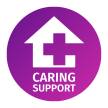All About Developmental Support Workers (DSW)
All About Developmental Support Workers (DSW)

As society progresses, the demand for developmental support workers (DSWs) continues to rise. This is due to the increasing number of people with developmental disabilities and mental health disorders requiring specialized support. In this article, we will explore what a DSW is, what their responsibilities are, the necessary education and experience, job skills, salaries, job types, and where they can work.
What Is A DSW?
A Developmental Support Worker (DSW) is a healthcare professional who assists individuals with developmental disabilities and mental health disorders in reaching their full potential. They provide emotional, physical, and mental support to individuals with developmental disabilities, including those with Autism Spectrum Disorder (ASD), cerebral palsy, Down syndrome, and intellectual disabilities. DSWs also provide care and support to individuals with mental health issues such as depression, anxiety, bipolar disorder, and schizophrenia.
What Is A Developmental Support Worker (DSW) Responsible For?
A DSW is responsible for providing care and support to individuals with developmental disabilities and mental health disorders. They help their clients in daily activities such as bathing, dressing, feeding, and toileting. DSWs also provide assistance in areas such as budgeting, meal planning, and transportation. They develop and implement care plans tailored to each client's specific needs, assist with medication management, and monitor vital signs. Additionally, DSWs advocate for their clients and collaborate with healthcare professionals to ensure that their clients receive the best care possible.
DSW Job Skills
DSWs require a specific set of skills to provide quality care and support to individuals with developmental disabilities and mental health disorders. Some of the key job skills required to become a successful DSW include:
- Strong communication and interpersonal skills: DSWs must be able to communicate effectively with their clients, families, and healthcare professionals.
- Patience, compassion, and empathy: DSWs must be patient and understanding, as they work with individuals who may have complex needs or require additional support.
- Ability to work independently and as part of a team: DSWs must be able to work independently, but also collaborate with other healthcare professionals to ensure their clients receive the best care possible.
- Organizational and problem-solving skills: DSWs must be able to prioritize tasks, manage time effectively, and develop care plans tailored to each client's specific needs.
- Understanding of developmental disabilities and mental health disorders: DSWs must have a good understanding of the disabilities and disorders they are working with, as well as the various support and care strategies available.
- Ability to provide physical, emotional, and mental support: DSWs must be able to provide care and support in various areas such as daily activities, budgeting, meal planning, and transportation. They must also be able to provide emotional and mental support to their clients.
Education And Experience Necessary To Become A DSW
To become a DSW, there are certain education and experience requirements that must be met. Some of these requirements include:
Education Necessary:
- A high-school diploma or equivalent is required
- A college diploma or certificate in a related field such as Developmental Services Worker, Personal Support Worker (PSW), or Social Service Worker is preferred
- College diploma or certificate programs typically take one to two years to complete and include courses such as developmental psychology, behaviour management, and communication strategies
- Practical experience through co-op placements or internships is often a requirement
- Graduates must register with the Ontario College of Developmental Services Workers (OCDSW) and become certified as a DSW
- Volunteering or working in a related field such as healthcare, social work, or child and youth work is highly valued by employers
- Some employers may require specific experience working with individuals with developmental disabilities or mental health disorders
- On-the-job training is often provided to new employees to help them gain the necessary skills and experience to provide quality care and support to their clients.
- Entry-level salaries start at around $16.00 per hour
- Experienced DSWs can earn up to $35.00 per hour
- DSWs who work in hospitals or other healthcare facilities may earn more than those who work in community-based settings
- Salaries may vary by region, with DSWs in urban areas typically earning more than those in rural areas
- Hospitals and long-term care facilities
- Community-based organizations, such as non-profit organizations and group homes
- Schools, supporting students with developmental disabilities and mental health disorders
- Private homes, providing care and support to individuals with developmental disabilities and mental health disorders
- Government-funded healthcare facilities, such as clinics and community health centres
- Respite care settings, providing short-term relief to families and caregivers of individuals with developmental disabilities or mental health disorders
Experience Necessary:
How To Become A DSW
To become a DSW, individuals must complete a college diploma or certificate program in a related field. These programs typically take one to two years to complete and include courses such as developmental psychology, behaviour management, and communication strategies. Additionally, practical experience through co-op placements or internships is often a requirement. Once the program is completed, graduates can register with the Ontario College of Developmental Services Workers (OCDSW) and become certified as a DSW.
DSW Salaries
The salary of a DSW in Canada varies depending on the employer, job location, and level of experience. According to the Government of Canada Job Bank, the median hourly wage for a DSW in Canada is $23.00. Here are some key statistical details regarding DSW salaries in Canada:
It is important to note that these are median values, and salaries can vary based on a variety of factors such as education, experience, location, and demand. It is also important to do your research and compare salaries for specific job postings and employers to ensure that you are being fairly compensated for your work as a DSW.
How To Find DSW Jobs In Ottawa And The Rest Of Ontario
There are several ways to find DSW jobs in Ottawa and the rest of Ontario. One option is to search online job boards such as Indeed, Monster, and Workopolis. Another option is to check the websites of healthcare organizations, such as hospitals, community health centers, and non-profit organizations, as they often have job postings listed on their websites. Networking is also an effective way to find job opportunities. Attending job fairs, connecting with professionals in the industry, and joining professional organizations are all ways to expand your network and increase your chances of finding a job as a DSW.
Another excellent resource for finding Developmental Support Worker (DSW) jobs is Caring Support. Caring Support is an all-in-one healthcare employment platform that connects healthcare workers to employers. They have an extensive database of DSW employers in Ontario, making it easy to find Developmental Support Worker jobs in Ottawa and the rest of the province.
What Types Of DSW Jobs Are There?
There are many different types of DSW jobs available in Ontario. Some DSWs work in community-based settings, providing support and care to individuals with developmental disabilities and mental health disorders in their homes or in the community. Others work in hospitals or long-term care facilities, providing care and support to patients with developmental disabilities and mental health disorders. There are also opportunities for DSWs to work in schools, supporting students with developmental disabilities and mental health disorders. Additionally, there are opportunities to work as a support worker for adults with disabilities or in group homes.
Where Can I Work As A DSW?
DSWs can work in a variety of settings, depending on their interests, skills, and qualifications. Here are some of the key locations where DSWs can find work:
It's important to note that the job opportunities available to DSWs may vary by region and employer. It's important to research the job market in your area to identify potential job opportunities and determine what types of settings you would be interested in working in as a DSW.
The Future Of DSW Jobs
The future of DSW jobs is promising, as the demand for healthcare professionals in this field is expected to increase in the coming years. According to the Government of Canada Job Bank, employment opportunities for DSWs are projected to increase by 7.2% between 2019 and 2028. This growth is due to an aging population and the increasing prevalence of developmental disabilities and mental health disorders. As a result, there will be a greater need for healthcare professionals who can provide specialized care and support to individuals with these conditions.
Conclusion
Becoming a DSW is a rewarding and fulfilling career path. DSWs play a crucial role in supporting individuals with developmental disabilities and mental health disorders, helping them to achieve their full potential. The necessary education and experience, job skills, and job opportunities vary depending on the employer and job location. However, with the demand for healthcare professionals in this field on the rise, the future of DSW jobs is promising. By using resources such as Caring Support, finding job opportunities as a DSW has never been easier.
Source: https://www.caringsupport.com/blog/all-about-developmental-support-workers






Comments
Caring Support is not accepting comments at the moment
Want to show your support? Send them a one-off tip.